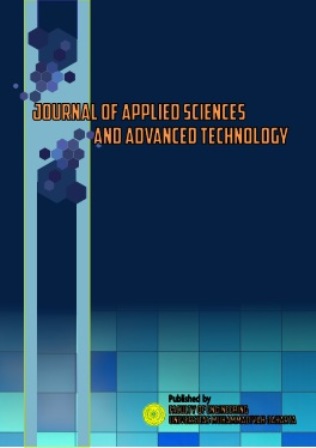Analysis of Viscosity of Lubricating Oil on Generator Machine Working Hours at KP. Macan Tutul 4203
DOI:
https://doi.org/10.24853/jasat.1.3.69-74Keywords:
Lubricating oil, viscosity, total base numberAbstract
Lubricating oil is a liquid used as a lubricant in a machine to reduce wear due to friction, and as a coolant and silencer, but high temperatures on the engine will damage the lubricant. When the lubricant power is reduced, the friction will increase and then the heat will arise more and more so that the temperature continues to increase. Engine oil should have high viscosity or viscosity, not inflammable not easy to oxidize and not frothy due to high rotation that occurs inside the machine. other than that lubricating oil serves to protect the inside of an engine parts from rust or corrosion caused by liquids in lubricants and acid properties which are the result of high temperature combustion in the machine. The purpose of this research is to know the viscosity and content contained in lubricant oil of Meditran sx plus SAE 15W-40 in hours of use 50,100,150 and 200 hours of machine work with laboratory test method. The results obtained in the laboratory test viscosity of new lubricant oil is 14.55 cSt to the use of lubricating oil 50 hours of machine work, then the use of lubricating oil 100 hours working machine, there has been a decrease in viscosity from 13.15 cSt to 12.85 cSt and on usage lubricating oil 150 working hours fixed viscosity of 12.85 cSt then on the use of lubricating oil 200 hours of work decreased viscosity to 12.62 cSt.Downloads
References
Galbi, Mohammad dan Ishak, 2016; Prediksi Penggantian Minyak Pelumas Motor Diesel Generator Set Berdasarkan Laju Perubahan Viskositas Dan Total Base Number Dengan Pendekatan Linieritas, Program Studi Teknik Mesin, UPN “Veteran” Jakarta , BINA TEKNIKA, Volume 12 Nomor 1, Edisi Januari 2016, 111-120 (in Indonesian)
Arisandi,M; Darmanto, T.Priangkoso, 2012; Analisa Pengaruh Bahan Dasar Pelumas Terhadap Viskositas Pelumas Dan Konsumsi Bahan Bakar, Jurusan Teknik Mesin Fakultas Teknik Universitas Wahid Hasyim Semarang Jl Menoreh Tengah X/22 Semarang; Momentum, Vol. 8, No. 1, April 2012 : 56- 61 (in Indonesian)
Massora, Musthaqim, Frangky E, Kaparang dan Fransisco P.T. Pangalila, Program Studi Pemanfaatan Sumberdaya Perikanan, Fakultas Perikanan dan Ilmu Kelautan, Universitas Sam Ratulangi, Manado 95115; Hubungan jenis pelumas dengan suhu mesin induk KM. Tuna Lestari 16; Jurnal Ilmu dan Teknologi Perikanan Tangkap 1(6): 191-196, Desember 2014 ISSN 2337-4306. (in Indonesian)
Tauviqirrahman, Mohammad, Muchammad dan Rizqy Amanullah Akbar ; 2018; Pengaruh Pemberian Tekstur Pada Permukaan Journal Bearing Terhadap Performasi Pelumasan ; Jurusan Teknik Mesin, Fakultas Teknik, Universitas Diponegoro; Jl. Prof. Sudarto, SH, Kampus Undip Tembalang, Semarang 50275. Prosiding SNST ke-9 Tahun 2018. (in Indonesian)
Sudarmaji. 2007. Analisa Gangguan dan Cara Mengatasi Sistem Pelumasan Mazda MR. Semarang: Jurusan Teknik Mesin Universitas Negeri Semarang. (in Indonesian)
Alirejo, M Subroto; I Ketut Daging, Martin Martin, Basino Basino, Juniawan Preston Siahaan; 2018; Kajian Penerapan Viskositas Minyak Pelumas Pada Mesin Penggerak Utama Kapal Perikanan Di Pt. Hasil Laut Sejati, Jurnal Kelautan Dan Perikanan Terapan Vol.1, No.1, 2018. (in Indonesian)
Parmin Lumbantorun dan Erislah Yulianti, 2016, Pengaruh Suhu Terhadap Viscositas Minyak Pelumas,Universitas PGRI, Palembang. (in Indonesian)
Maulida, Rizky Hardiyatul dan Erika Rani, Analisis Karakteristik Pengaruh Suhu Dan Kontaminan Terhadap Viscositas Oli, Jurnal Neutrino Vol.3, No.1, Oktober 201. (in Indonesian)
Maanen,P.Van, 1983. Motor Diesel Kapal Jilid 1. Indonesia: Nautech. (in Indonesian)
Downloads
Published
Issue
Section
License
COPYRIGHT POLICY
The author(s) of an article published in the Journal of Applied Sciences and Advanced Technology (JASAT) retains ownership of the intellectual property rights in work (s).
PUBLISHING RIGHTS
The author(s) of an article published in the Journal of Applied Sciences and Advanced Technology (JASAT) have unrestricted publication rights. The authors give the Journal of Applied Sciences and Advanced Technology (JASAT) the right to publish the article and designate the Faculty of Engineering Universitas Muhammadiyah Jakarta Publishing as the original publisher of the article.
LICENSING POLICY
JASAT is an open-access journal that follows the Creative Commons Non-Commercial 4.0 International License (CC BY-NC 4.0), which states that:

Under this license, the reusers must give appropriate credit, provide a link to the license, and indicate if changes were made. Users may do so in any reasonable manner, but not in any way that suggests the licensor endorses users or their use.
Please take the time to read the whole license agreement (https://creativecommons.org/licenses/by-nc/4.0/). As long as reusers follow the license conditions, the owner cannot withdraw these freedoms. The following components are included under this license:
 Attribution: Users must provide appropriate attribution, including a link to the license, and indicate whether or not they made any modifications. Users are free to do so reasonably, but not in a manner that indicates the licensee approves of their usage.
Attribution: Users must provide appropriate attribution, including a link to the license, and indicate whether or not they made any modifications. Users are free to do so reasonably, but not in a manner that indicates the licensee approves of their usage.
 NonCommercial: Users may not use the material for commercial purposes.
NonCommercial: Users may not use the material for commercial purposes.












_2.png)


1.png)

2.png)
